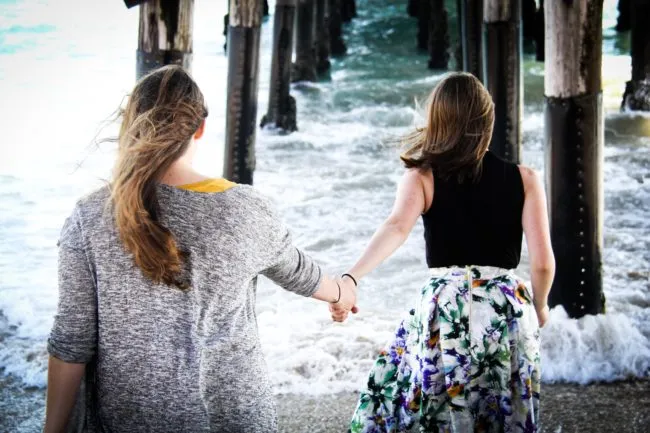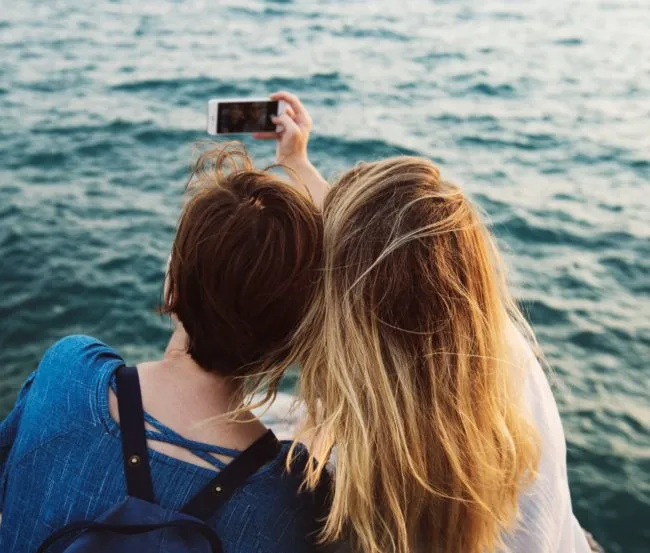This is what it means when couples constantly post pictures of each other on social media

“They think we have sex how often?!” (Pexels)
"They think we have sex how often?!" (Pexels)
We’ve all been there: you’re casually scrolling through Facebook, Twitter or Instagram when all of a sudden you see a smug selfie of a grinning, brand-new couple, usually taken from an impossible angle in a really nice location, with hashtags like #howcutearewe, #loveubabe or #sexygaysabouttown that seem designed to make people reading them feel a little bit sick and (if they’re single) a little bit jealous, too.
Then there are friends who go a step further and post solo pics of their partner sleeping, or eating a salad, or shirtless after a gym session, or just shopping for bread in ASDA, with hashtags like #iamSOlucky, #mybetterhalfissocute, #checkoutbaesabs and #cantwaittoeatsandwicheswiththisone.
Related: This man takes 200 selfies a day
In fact, you end up seeing more photos of their significant other than your friend. But why do people do that?
We spoke to expert neuroscientist Dr Dean Burnett, author of bestselling science books The Idiot Brain and The Happy Brain, to find out.
“Well,” says Dr Burnett. “There are several reasons why people choose to post romantic, coupley pictures of themselves with their partner.

“The most basic ones are a desire to conform. It’s quite likely that many feel that they have to post couple pics or they’ll risk rejection or questioning from people who ‘expect’ them.
“This could all be a subconscious fear, of course: lot of (these actions) happen beneath the surface level.
Related: So, you’re thinking of opening your relationship
“Another explanation is that when we fall in love with someone, at least in the early stages, it knocks our typical brain workings out of whack.
“I go into more detail about this in The Happy Brain, if you want to find out more. Amongst other things, our focus and attention shift to concentrate almost exclusively on our partner; our thinking is largely about them, we become less able to see their flaws and problems and they fill our brains and make up a huge part of our everyday mental lives.
“Basically, it doesn’t occur to people in that state not to post coupley photos. Any worry that they might be showing bad judgement or annoying people is drowned out by the “high” of being in a new, exciting relationship.
“There’s another option, too: the idea that we should all aim to find someone to pair up with for life, and be completely faithful to, is a persistent and powerful one.
“It works for a lot of people, but not everyone, but nevertheless it’s become the ‘done thing’. It’s expected, we’re meant to do it, so when you find someone and form a relationship it’s a source of pride; i.e. you’re a ‘success’ now.
“Posting pics of your partner could be seen as a status thing, even if it’s not intended.
“It’s saying ‘We have found someone, we are life’s winners’, and thus you raise your own status. The human brain bloody loves being ‘high status’, however it happens.”

So, in effect, your instincts are probably right: these couples are showing off. What’s more, they can’t quite help it, these instincts are hard-wired into our brains, as a species. But there are other studies that suggest there’s even more to it than that.
Related: Dating app for trans people Transdr launches
According to Nikki Goldstein, a sexologist and relationship expert from Australia, it’s likely that people who post loads of intimate photos of their partner online are actually MORE insecure and unsure of their relationships.
In that case, sharing endless photos of each other is a way to mask the fact that their partnership is on shaky ground.
“Often it’s the people who post the most who are seeking validation for their relationship from other people on social media,” she told the Daily Mail.
“The likes and comments can be so validating that when someone is really struggling, that’s where they get their up from – not the person making the gesture, but what other people say about it.”
“You see people who will focus so much on taking a ‘relfie’ – a relationship selfie – and getting the right filter and hashtags that they’re missing the moment,” she added.
“I think, why don’t you take a photo because it’s a nice memory and a moment you want to look back to? Couples are taking these photos, straight away putting them online and then watching the likes and comments instead of being with their partners.”
There’s a lot of self-deception inherent in that type of sharing. You’re not 100 percent sure if you like the other person, or that they like you, so you try to “tip the scales” by splashing it all over Facebook, Twitter, Instagram and any other social media site you can find.

Related: New Maltesers advert features hilarious discussion about lesbian dating
This can help provide a sense of control that they feel is otherwise lacking in the situation, and potentially raise the stakes so your partner is less likely to leave you.
So the next time you see a slightly stalkerish photo of your friend’s other half on Facebook, or a slightly sick-inducing “relfie” on Instagram, try not to judge the photographer too harshly.
They might be going through some pretty stressful emotions behind the scenes.
Or maybe they really are just being smug and attempting to “boost their status” by showing their partner off, but if so, it seems that they can’t really help it.
The Happy Brain by Dr Dean Burnett is available to buy on Amazon for £7.99.

